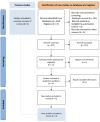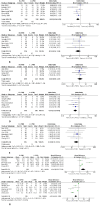Robotic versus laparoscopic total mesorectal excision with lateral lymph node dissection for advanced rectal cancer: A systematic review and meta-analysis
- PMID: 38809911
- PMCID: PMC11135705
- DOI: 10.1371/journal.pone.0304031
Robotic versus laparoscopic total mesorectal excision with lateral lymph node dissection for advanced rectal cancer: A systematic review and meta-analysis
Abstract
Introduction: Lateral pelvic node dissection (LPND) poses significant technical challenges. Despite the advent of robotic surgery, determining the optimal minimally invasive approach remains a topic of debate. This study aimed to compare postoperative outcomes between robotic total mesorectal excision with LPND (R-LPND) and laparoscopic total mesorectal excision with LPND (L-LPND).
Methods: This meta-analysis was conducted according to the Preferred Reporting Items for Systematic Review and Meta-analysis (PRISMA) 2020 and AMSTAR 2 (Assessing the Methodological Quality of Systematic Reviews) guidelines. Utilizing the RevMan 5.3.5 statistical package from the Cochrane Collaboration, a random-effects model was employed.
Results: Six eligible studies involving 652 patients (316 and 336 in the R-LPND and L-LPND groups, respectively) were retrieved. The robotic approach demonstrated favourable outcomes compared with the laparoscopic approach, manifesting in lower morbidity rates, reduced urinary complications, shorter hospital stays, and a higher number of harvested lateral pelvic lymph nodes. However, longer operative time was associated with the robotic approach. No significant differences were observed between the two groups regarding major complications, anastomotic leak, intra-abdominal infection, neurological complications, LPND time, overall recurrence, and local recurrence.
Conclusions: In summary, the robotic approach is a safe and feasible alternative for Total Mesorectal Excision (TME) with LPND in advanced rectal cancer. Notably, it is associated with lower morbidity, particularly a reduction in urinary complications, a shorter hospital stay and increased number of harvested lateral pelvic nodes. The trade-off for these benefits is a longer operative time.
Copyright: © 2024 Chaouch et al. This is an open access article distributed under the terms of the Creative Commons Attribution License, which permits unrestricted use, distribution, and reproduction in any medium, provided the original author and source are credited.
Conflict of interest statement
No conflict of interest to disclose
Figures




References
-
- Otero de Pablos J, Mayol J. Controversies in the Management of Lateral Pelvic Lymph Nodes in Patients With Advanced Rectal Cancer: East or West? Front Surg [Internet]. 2020. [cité 24 juill 2023];6. Disponible sur: https://www.frontiersin.org/articles/10.3389/fsurg.2019.00079. - DOI - PMC - PubMed
-
- Bae JH, Song J, Yoo RN, Kim JH, Kye BH, Lee IK, et al.. Robotic Lateral Pelvic Lymph Node Dissection Could Harvest More Lateral Pelvic Lymph Nodes over Laparoscopic Approach for Mid-to-Low Rectal Cancer: A Multi-Institutional Retrospective Cohort Study. Biomedicines. 27 mai 2023;11(6):1556. doi: 10.3390/biomedicines11061556 - DOI - PMC - PubMed
-
- Ogura A, Konishi T, Cunningham C, Garcia-Aguilar J, Iversen H, Toda S, et al.. Neoadjuvant (Chemo)radiotherapy With Total Mesorectal Excision Only Is Not Sufficient to Prevent Lateral Local Recurrence in Enlarged Nodes: Results of the Multicenter Lateral Node Study of Patients With Low cT3/4 Rectal Cancer. J Clin Oncol. 1 janv 2019;37(1):33‑43. doi: 10.1200/JCO.18.00032 - DOI - PMC - PubMed
-
- Du R, Zhou J, Li D, Zhang Q, Liu J, Ma C, et al.. Postoperative morbidity and mortality after mesorectal excision with laparoscopic versus conventional open lateral lymph node dissection for advanced rectal cancer: A meta-analysis. Asian J Surg. janv 2021;44(1):26‑35. doi: 10.1016/j.asjsur.2020.06.010 - DOI - PubMed
Publication types
MeSH terms
LinkOut - more resources
Full Text Sources

